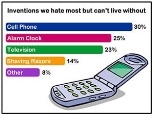Nearly one in three adults say the cell phone is the invention they most hate but cannot live without, according to the eighth annual Lemelson-MIT Invention Index study.
With its score of 30 percent, the cell phone narrowly beat the alarm clock (25 percent) and television (23 percent) for the distinction in the survey, which gauges Americans' attitudes toward invention. Razors, microwaves, coffee pots, computers and vacuum cleaners were also cited as essential yet despised inventions.
While the Lemelson-MIT Invention Index found a vast majority of Americans (95 percent) believe inventions have improved the quality of life in the United States, their strong feelings toward cell phones illustrate both the benefits and unintended consequences of innovation.
"Cell phones have clearly been beneficial in terms of increasing worker productivity and connecting people with family and friends," said Merton Flemings, director of the Lemelson-MIT Program, a nonprofit organization that celebrates inventors and inventions. "However, the Invention Index results show that the benefits of an invention sometimes come with a societal cost."
The good news, Flemings added, is that invention is cumulative. "Side effects or limitations of an invention create new opportunities for further innovations," he said.
In the case of the cell phone, MIT Media Lab researchers Chris Schmandt and Stefan Marti recognized an opportunity to solve the societal problems by making mobile communication devices socially intelligent.
"Most people dislike cell phones because they either feel tethered to them or they are annoyed by others who use them in inappropriate public places, such as restaurants or movie theaters," Marti said. "We are exploring ways to give these devices human-style social intelligence, which means that they would know what we as owners expect them to do--and especially what not to do--without our having to tell them explicitly every time."
Inventions Make Life Easier or More Difficult?
In addition to cell phones, the Lemelson-MIT Invention Index also looked at the impact of popular inventions such as e-mail, voicemail, and credit and debit cards.
Teens overwhelmingly believed e-mail (81 percent) and voicemail (71 percent) make life simpler. Adults agreed to a lesser extent; roughly three out of five said e-mail (59 percent) and voicemail (58 percent) have made life easier.
Interestingly, teens have mixed reactions about credit and debit cards. Only 32 percent said they make life easier, while 26 percent said they make life more difficult and 39 percent felt they make life both simpler and more difficult. Half of the adults surveyed said the benefits of credit and debit cards outweigh any disadvantages.
Can the U.S. Remain Inventive?
The Lemelson-MIT Invention Index also raised concerns about whether future generations of Americans will have the technical skills and ingenuity to continue solving societal problems through invention.
When asked how globally competitive the United States will be 10 years from now in terms of invention, 57 percent of adults and 55 percent of teens surveyed said America will be losing ground to other countries.
These perceptions support preliminary observations from a recent Lemelson-MIT Program workshop on intellectual property that found that foreign entities are likely to receive more U.S. patents within the next few years than American entities.
The Lemelson-MIT Invention Index also found that an equal proportion of Americans believe the responsibility for encouraging invention and innovation right now falls equally to industry and universities (26 percent each). Twenty-one percent thought the responsibility lies with primary schools. Only 14 percent said government plays a role.
"We need to figure out ways to better prepare and encourage future generations of Americans to invent," Flemings said. "Innovation can only flourish in a supportive society. The Invention Index alludes to the risks our culture faces if we neglect to support and embrace inventors and their contributions."
In April, the Lemelson-MIT Program will host the first-ever Invention Assembly where leaders from industry, academia and government will explore new ways to nurture an inventive culture.
About the Lemelson-MIT Program
The Lemelson-MIT Program provides the resources and inspiration to make invention and innovation more accessible to today's youth. It accomplishes this mission through outreach activities and annual awards, including the world's largest prize for invention, the $500,000 Lemelson-MIT Prize.
The Lemelson-MIT Program was founded in 1994 at the MIT by Jerome H. Lemelson, one of the world's most prolific inventors, and his wife, Dorothy. It is funded by the Lemelson Foundation, a private philanthropy committed to honoring the contributions of inventors, innovators and entrepreneurs and to inspiring ingenuity in others.
Taylor Nelson Sofres Intersearch conducted the 2004 Lemelson-MIT Invention Index survey from Nov. 12-19, 2003. A nationally representative sample of 1,023 adults and 500 teens (ages 12 to 17) was used. The margin of error for the adult sample was +/- 3.2 percent; for the teens, it was +/- 4.4 percent.






